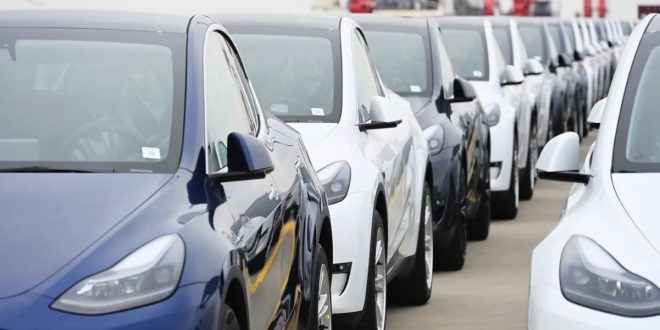Tesla dominates the U.S. electric vehicle market. Now it wants stricter regulations to gain an edge.
Tesla is urging the Biden administration to adopt stricter fuel economy standards than regulators have proposed, which will irritate legacy automakers like General Motors, Ford, and Stellantis. These three companies face $10.5 billion in non-compliance fines from 2027 to 2032 under the proposed standards and have urged regulators to ease up.
Tesla’s request for regulators to double down is another way it outperforms competitors. GM, Ford, and Stellantis are in a bitter union strike that has cost $3.45 billion and will delay their electric vehicle rollout. As strike costs rise, these automakers’ premium EV sales appear to be declining. Tesla benefits from strikes and stricter fuel standards because its workforce is non-unionized and it only makes electric cars.
Tesla may need the boost to maintain its U.S. EV market share. The company is slashing car prices to boost sales. While Tesla delivered a record number of vehicles in Q3, its market share fell 10 points from a year earlier.
Tesla wrote to the NHTSA that it should finalize rules to increase Corporate Average Fuel Economy (CAFE) standards by 6% for passenger cars and 8% for trucks and SUVs. This is up from NHTSA’s proposal of 2% for cars and 4% for trucks and SUVs, which would achieve 58 mpg fleet fuel economy by 2032.
Tesla claims its proposals would “significantly reduce energy consumption, mitigate climate change, and appropriately recognize the increasing marketplace adoption of BEV technology in both the light-duty and [heavy-duty pickup truck] sectors.” That last part matters. Tesla’s letter to NHTSA argues that the agency miscalculates EV market penetration.
Tesla notes that Toyota, Hyundai, JLR, and Subaru have announced EV production goals within the proposed standard’s timeframe, and that automakers and battery makers have committed over $115 billion to North American EV and battery production.
“EVs represent 9.1% of new light-duty vehicle sales in the second quarter of 2023,” the letter says. “Continuing this rapid growth has led to estimates that by 2024 every third commercially newly registered car could be electric.”
Tesla also criticizes NHTSA for not modeling future vehicles like the Cybertruck pickup. Tesla plans to start delivering the Cybertruck later this year after a long delay. The EV maker may have told NHTSA how many vehicles it will deliver this year and how production will ramp up. Although that information was redacted from the letter, Tesla clearly believes it can produce enough to make the heavy-duty pickup truck standards it suggested “technologically feasible” by 2024.
NHTSA also proposes reducing “off-cycle credits,” which allow automakers to earn credits for adopting technologies that improve real-world fuel efficiency beyond CAFE standards. Things like better air conditioning and engine stop-start systems that shut off the engine when stopped. Tesla says NHTSA should eliminate those options.
Tesla writes that off-cycle crediting creates asymmetry in regulation favoring ICE vehicles, diverts research and development investment away from electrification’s best emissions reduction technology, and weakens the standard.
In the letter, Tesla mixed humble brags about its technological capabilities with reminders that its fuel standards would improve climate outcomes. Yes, stricter fuel standards reduce emissions, but only if automakers comply. Otherwise, they’ll be fined for noncompliance.
The Alliance for Automotive Innovation said last month that the proposed standards would cost automakers over $14 billion in non-compliance penalties between 2027 and 2032. Toyota said Tuesday that those fines prove the standards are technologically impractical.
Most automakers consider NHTSA’s proposals unreasonable and have requested changes. Tesla’s radical standards were probably too much for them.
The American Automotive Policy Council, which represents GM, Ford, and Stellantis, urged NHTSA to halve its truck fuel economy increases to 2% because they would “disproportionately impact the truck fleet.” The organization reported 83% of Ford, GM, and Stellantis vehicles are trucks.
Tesla would be safe again. The Elon Musk-owned automaker began delivering its electric Semi truck in December 2022 and announced a $3.6 billion Nevada gigafactory expansion in January to scale Class 8 truck production.
The Zero Emission Transportation Association, a coalition of companies advocating for 100% EV sales, supported the Energy Department’s proposal to revise CAFE’s petroleum-equivalent fuel economy ratings for EVs earlier this year. However, automakers claim that revision would reduce EV fuel economy by 72%.
 Tech Gadget Central Latest Tech News and Reviews
Tech Gadget Central Latest Tech News and Reviews




